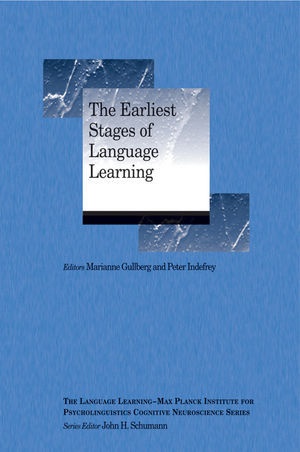Read more
Informationen zum Autor Marianne Gullberg is Professor of Psycholinguistics and Director of the Humanities Lab at Lund University, Sweden. With Peter Indefrey she previously headed the research project "The Dynamics of Multilingual Processing" at the Max Planck Institute for Psycholinguistics, Nijmegen. Her research focuses on the earliest stages of adult second language acquisition and on the advanced or bilingual stage, examining lexical semantics, cross-linguistic (bi-directional) influences, code-switching, and the production and comprehension of gestures. She has published in a range of journals, including Language Learning , Studies in Second Language Acquisition , Bilingualism: Language and Cognition , and Brain and Language . Peter Indefrey is Professor of Psycholinguistics and Neurolinguistics at the Heinrich Heine University Düsseldorf, Germany, and research fellow at the Donders Centre for Cognitive Neuroimaging in Nijmegen. With Marianne Gullberg he previously headed the research project "The Dynamics of Multilingual Processing" at the Max Planck Institute for Psycholinguistics. His research is on first and second language processing and their neural correlates. Some of his favorite topics are syntactic and morphological processing, word production, reading, and the development of language processing in L2 learners. He has published in a variety of journals, including Cognition , PNAS , Neuroimage , Journal of Experimental Psychology , and Journal of Cognitive Neuroscience . Klappentext To understand the nature of language learning, the factors that influence it, and the mechanisms that govern it, it is crucial to study the very earliest stages of language learning. This volume provides a state-of-the art overview of what we know about the cognitive and neurobiological aspects of the adult capacity for language learning. It brings together studies from several fields that examine learning from multiple perspectives using various methods. The articles examine learning after anything from a few minutes to months of language exposure; they target the learning of both artificial and natural languages, involve both explicit and implicit learning, and cover linguistic domains ranging from phonology and semantics to morphosyntax. The findings will inform and extend further studies of language learning in multiple disciplines. Zusammenfassung To understand the nature of language learning, the factors that influence it, and the mechanisms that govern it, it is crucial to study the very earliest stages of language learning. This volume provides a state-of-the art overview of what we know about the cognitive and neurobiological aspects of the adult capacity for language learning. Inhaltsverzeichnis 1. The Earliest Stages of Language Learning: Introduction (Peter Indefrey & Marianne Gullberg). 2. Adult Language Learning after Minimal Exposure to an Unknown Natural Language (Marianne Gullberg, Leah Roberts, Christine Dimroth, Kim Veroude, & Peter Indefrey). 3. Neurocognition of New Word Learning in the Native Tongue: Lessons from the Ancient Farming Equipment Paradigm (Matti Laine & Riitta Salmelin). 4. A Complementary Systems Account of Word Learning in L1 and L2 (Shane Lindsay & M. Gareth Gaskell). 5. The Role of Linguistic Input in the First Hours of Adult Language Learning (Rebekah Rast). 6. Learned Attention Effects in Second Language Acquisition (L2A) of Temporal Reference in Latin and Spanish: The First Hour and the Next Eight Semesters (Nick C. Ellis & Nuria Sagarra). 7. Short-term Grammatical Plasticity in Adult Language Learners (Douglas J. Davidson). 8. Brain Potentials Reveal Discrete Stages of L2 Grammatical Learnin (Judith McLaughlin, Darren Tanner, Ilona Pitkänen, Cheryl Frenck-Mestre, Kayo Inoue, Geoffrey Valentine, & Lee Osterhout). <...

